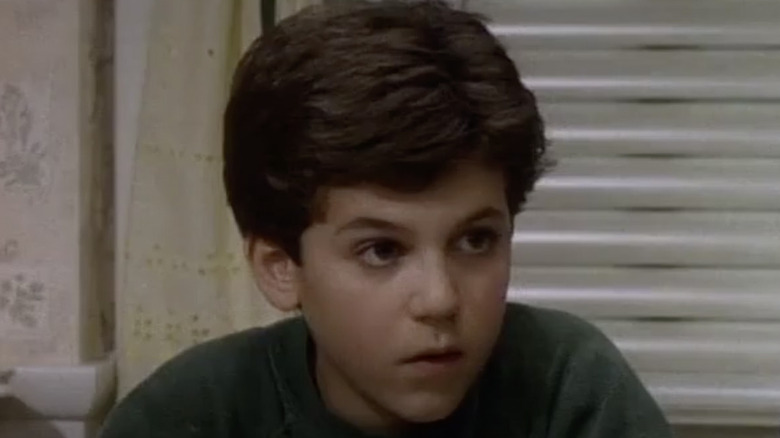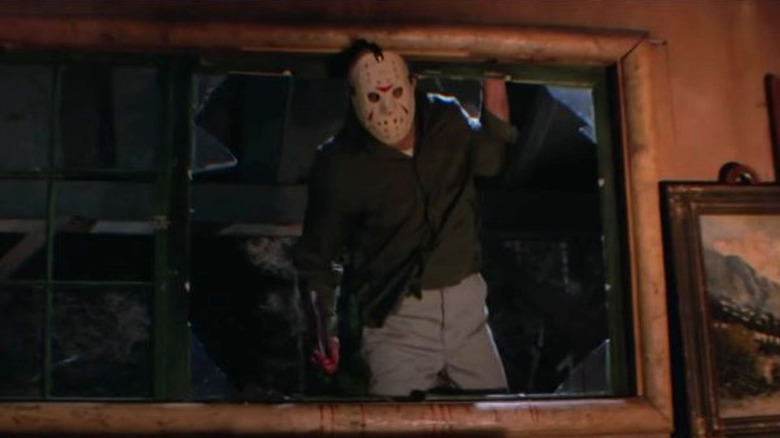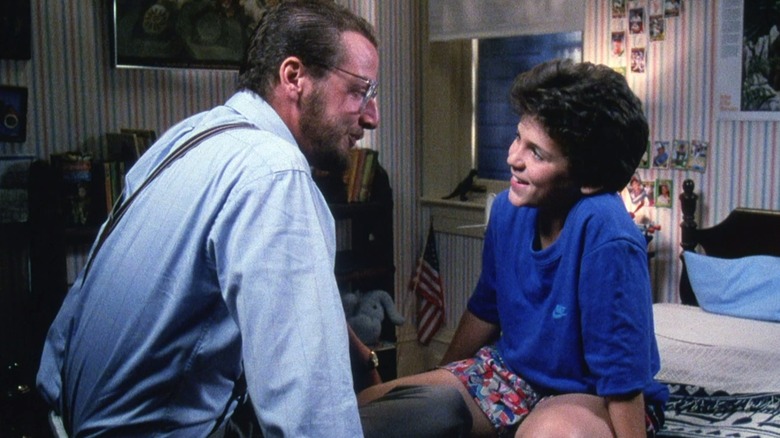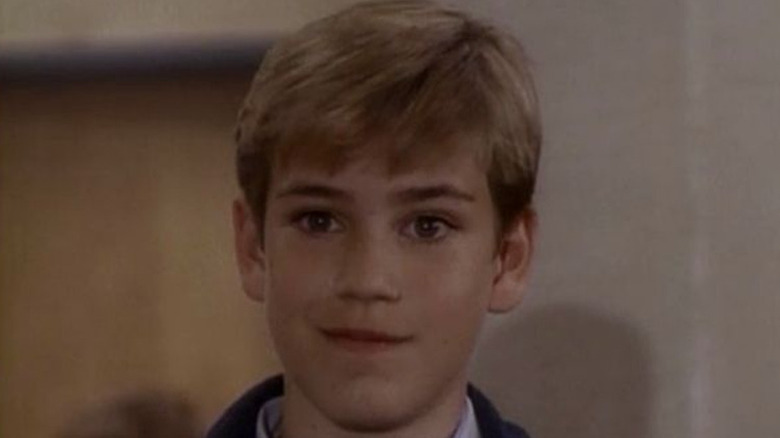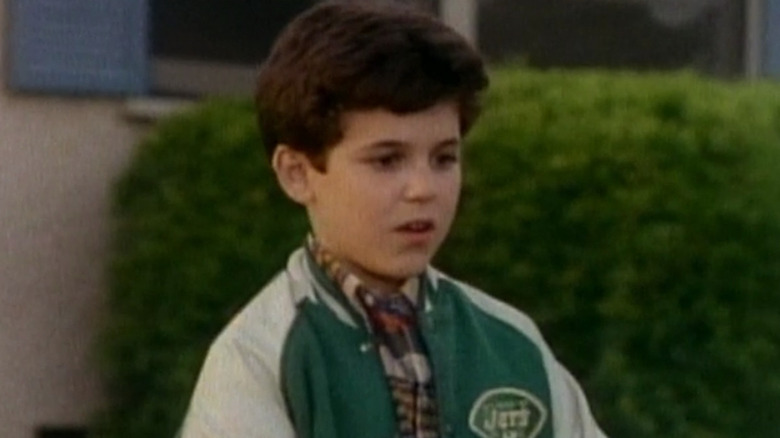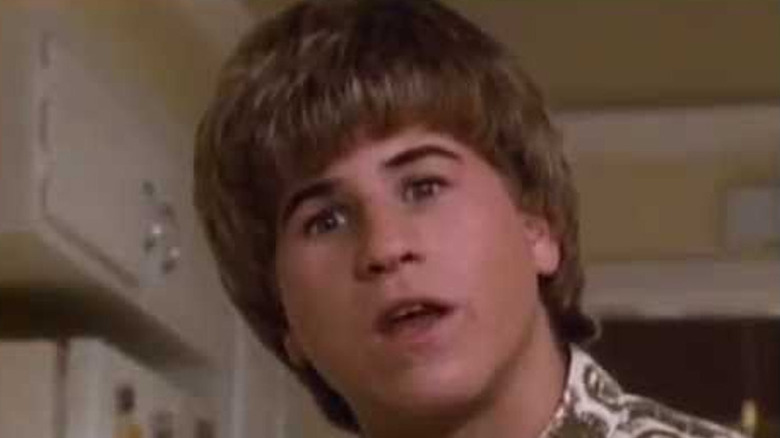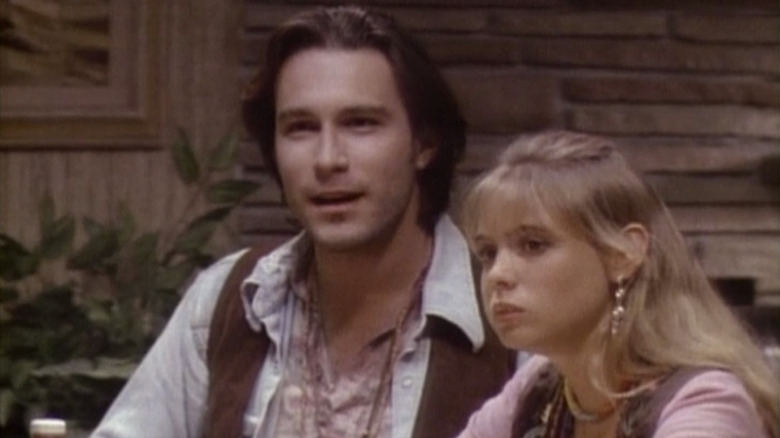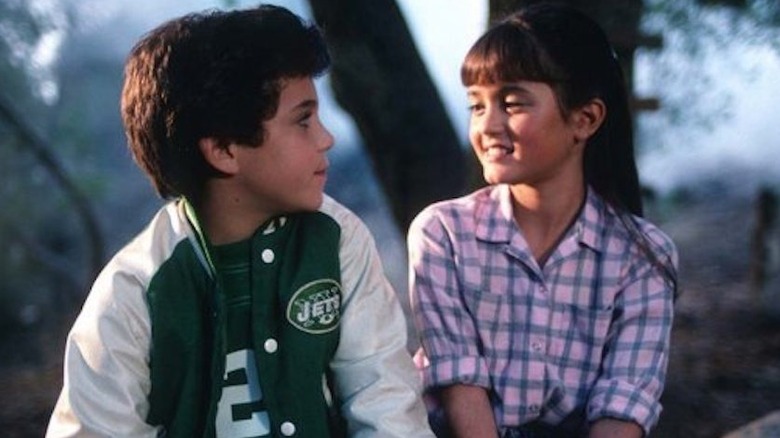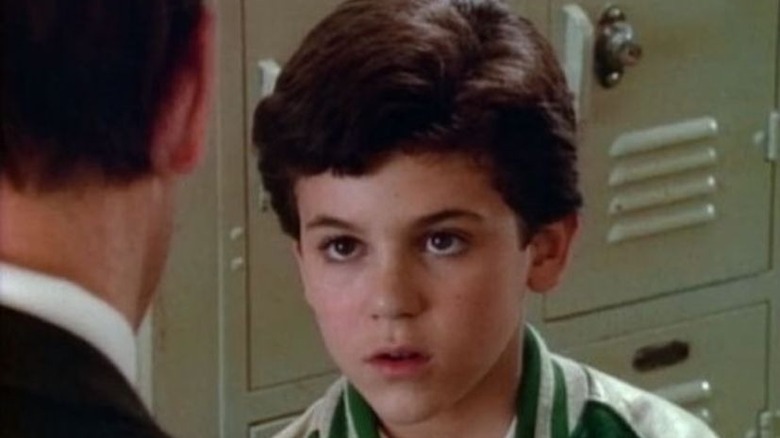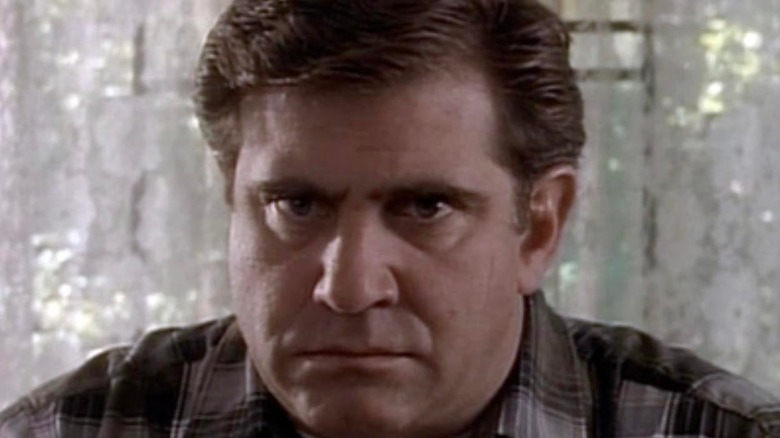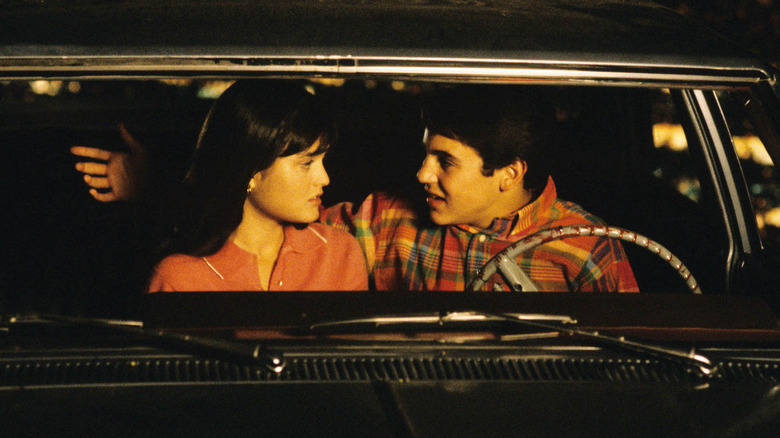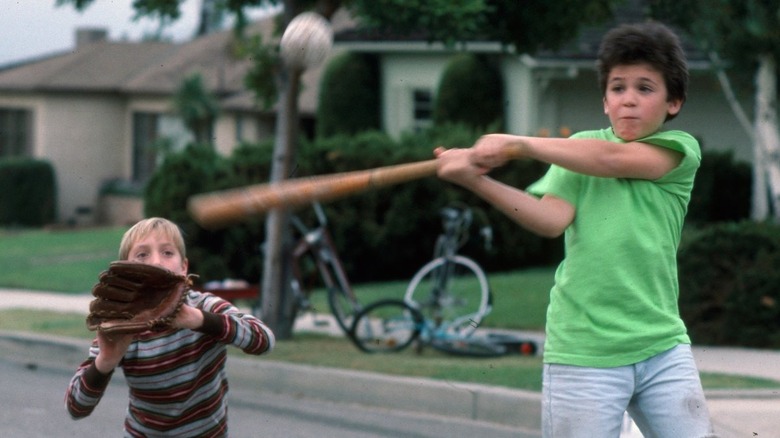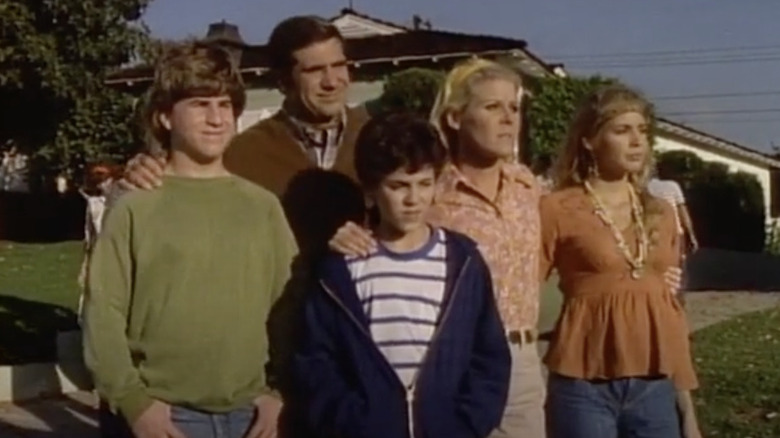Things Only Adults Notice In The Wonder Years
In the 1980s, a generation of people in America referred to as "Baby Boomers" were settling into adulthood. They came of age during a very turbulent time in American history where the Vietnam War had deeply divided the country, the battle for civil rights was being fought across America, people were losing trust in their leaders, and the threat of a nuclear attack loomed over everyday life.
Still, many of the Baby Boomers were kids at the time. Despite the sociological strife, they spent long afternoons riding bikes, playing sports, worrying about school, agonizing over how to talk to their crushes, and listening to great music. Now that they found themselves in a world where the middle class was shrinking and they had all these bills and responsibilities to worry about, they naturally looked back on those years for comfort. That is where the comedy/drama series "The Wonder Years" comes in.
The series follows young Kevin Arnold (Fred Savage), as he navigates his teenage years from the '60s to the 1970s. From 1988 to 1993, families witnessed Kevin go from an awkward, optimistic kid of 12 to a slightly more confident high school graduate. For parents, it must have been a bittersweet trip down memory lane while kids saw their own age group depicted honestly on screen.
It's been over 30 years since the show premiered, and since then, a "Wonder Years" reboot has arrived. So, it's time for the kids of Baby Boomers to look back at the original series and see what we notice.
Horror movie connections
When watching the pilot for "The Wonder Years," movie buffs will notice something pretty surprising right away. After that sweet and tender intro depicting Kevin's existence during the last summer before junior high, as the credits for the episode itself fade in and out at the bottom of the screen, a name comes up that might have you reaching for the pause button: director Steve Miner.
What's surprising is Miner got his start directing two very important slasher films of the early 1980s. While almost everyone will identify a hulking killer with a hockey mask as the mascot for the "Friday the 13th" franchise, it was actually Steve Miner who helped make that happen. In 1981, "Friday the 13th Part 2" was released. Since the original killer, Mrs. Voorhees, had been decapitated in the first film, a new antagonist was needed. So, her son Jason came in to pick up where she left off at Camp Crystal Lake.
However, in that first sequel, Jason wore a sack over his head. The trademark hockey mask so closely associated with the murderer didn't make its appearance until the next film, "Friday the 13th Part III." Both of those films were directed by Steve Miner. Later in his career, he would direct another icon of horror in "Halloween: H20."
Miner directed several episodes of "The Wonder Years" and was even a supervising producer. While there's no law that says a horror director can't transition to mainstream television, it doesn't happen often.
Little Monsters
One of the most entertaining aspects of "The Wonder Years" is Kevin's inner monologue, which is narrated by his older self. No matter the situation, the voice of adult Kevin pops in to provide context and insight into what young Kevin is thinking. It's used to both comedic and sentimental effect. Young Kevin, the kid we're following around, is played by child actor Fred Savage, while the voice for older Kevin is provided by actor Daniel Stern.
In 1989, about a year after the premiere of the series, Fred Savage starred in a strange and occasionally terrifying "family" film called "Little Monsters." He's not the only connection to "The Wonder Years" in this film either. Not only does his actual little brother, "Boy Meets World" star Ben Savage, appear in the movie as his younger brother, but Daniel Stern — grown Kevin himself — portrays his father.
While some more astute younger viewers probably made this connection at the time, it really stands out to an adult viewer and only serves to deepen the connection between the actors in our minds.
Before they were famous
Since "The Wonder Years" is about a group of pre-teens growing into adults, the show features a lot of young guest stars of the 1980s. Sometimes they have a large role – like Giovanni Ribisi (who plays Kevin's friend, Jeff) – and sometimes they're only there to fill out a scene, like Justin Whalin. A few examples of future stars who appear early in the series include both Mark-Paul Gosselaar and Dustin Diamond (Zack Morris and Samuel "Screech" Powers from "Saved by the Bell"), and Breckin Meyer.
As the show continues and Kevin and Paul become more active members of society, they come across even more now-familiar faces: Alicia Silverstone, Juliette Lewis, David Schwimmer, and several more that would take up too much space here. While a few of these young performers are instantly recognizable today, kids in the '80s may not have noticed who they were right away. It's a fun reminder that many of the stars of our childhood grew up along with us.
You're going to be okay
Making mountains out of molehills is not limited to the domain of children. We're constantly coming up against relatively small inconveniences that we convince ourselves are so much more important than they are. Usually, if we keep a level head and really consider a problem before reacting to it, the solution will become clear. Still, we're human, and that means our emotions tend to control us more than our capacity for rational thought.
When revisiting "The Wonder Years" as an adult, you really notice what a powerful salve time can be. We can relate to Kevin's panic over being thought of as a loser. We understand the pressure of not looking stupid in front of the class, the hurt and embarrassment of having elements of our private lives spread throughout the school, and how bad it feels to hurt someone's feelings just because we had a momentary lapse in judgment and said something we didn't really mean.
Over time, though, we see things a little differently, because we survived. So, when we watch Kevin Arnold experience those same problems and see the anguish on his face, his mood swings, and bitterness, we just want to grab him and say, "You're going to be okay." Yes, every problem is insurmountable when you're young, but with age comes perspective, and those wounds that seemed like they would never heal become faded memories from a simpler time.
Jason Hervey is hysterical
Kevin has two older siblings: Karen and Wayne. Karen is the oldest, and she's a hippie that thinks she's more mature than she is. She constantly fights with her parents about them not taking her or the array of problems in the world seriously. Meanwhile, Kevin's brother Wayne is, when you get right down to it, a bully. Fighting with siblings is just a part of growing up, so it makes sense that he would continuously give Kevin a hard time. However, Wayne doesn't limit his malice to just his little brother.
Given some of his more extreme behavior (like harassing girls on the bus and inadvertently murdering a hamster), it would be easy for us to loathe Wayne. However, Jason Hervey, the actor playing him (and already an acting veteran by the time the show came out), commits so completely to the absurdity of the character that we can't help but laugh. Whenever some serious drama is going on in the Arnold house, the editors can cut to Wayne sloppily eating his cereal, or making a silly face unrelated to what's happening around him, and get us chuckling.
His performance is always entertaining, even at his meanest. The kid just delights in other people's misery to a ludicrous degree. It's impossible to hate him, even though we definitely should.
The Wonder Years is still relevant
If you're a child of the '80s or later, "The Wonder Years" feels like it takes place in the distant past. The clothes were different, the music was different, and everything about the setting itself just seems old. But the sad truth is, even if you updated all the sets and wardrobe and pop culture references, the show would still be still painfully relevant.
"The Wonder Years" includes scenes of kids arguing with their parents about equal rights, oppression, and the illusion of freedom, while in the background, there are riots in the streets over someone's right to exist and be treated as a human being plus the looming threat of war. All of this is out in the open again. Our current divisive times and the ones depicted in the series are so similar that the fact that it takes place in the '60s and '70s is almost irrelevant.
The 2021 reboot of "The Wonder Years" perfectly summarizes how relevant the show still is in the opening moments of its pilot episode. As young Dean (Elisha Williams) rides his bike, his adult self (Don Cheadle) narrates, "Growing up, mom and dad gave me the police talk, about how to handle yourself around cops. There was a presidential election that created a racial divide, and there was a flu pandemic that they said would kill a million people around the world. But, it was 1968 and that was the state our country was in."
30 minutes is perfect
When revisiting "The Wonder Years," it seems almost impossible that the show is only a half hour. Actually, you're probably watching it now without commercials, so it's even shorter. It's surprising because these characters are so rich and the emotions being explored hit so deeply and that level of characterization and emotional impact is usually reserved for prestigious hour-long dramas.
How can the show work so well with such a short running time? Well, there isn't much room for multiple stories. This isn't a show with an "A" story and a "B" story. Each episode explores one situation and how it affects the people in Kevin's orbit. By limiting the runtime to half an hour, we're able to spend more time watching how characters react and adapt to a particular situation, which deepens our understanding of them.
Having less than a full 30 minutes to work with means the writers need to be economical with the stories they're trying to tell. Therefore, the episodes never have enough time to get boring or to introduce pointless storylines that will never go anywhere. Everything feels important, and it all carries significant weight, despite (or because of) the limited time constraints.
Kevin can be a brat
While the entire cast of "The Wonder Years" is great, Fred Savage is definitely the star. This is his show to carry, and he does it supremely well. Not only can he mug for the camera like all the best kid stars, but he sells the drama as well. The fact that he is such a capable and versatile actor is important because although he looks like a goody-goody, Kevin Arnold is no angel.
If you haven't revisited the show in a while, you might be surprised to see just how selfish and manipulative Kevin can be. It's not like he's Tony Soprano, but this "nice" kid is very capable of hurting someone's feelings or guilting them into getting his way. When Winnie gets a boyfriend, Kevin takes advantage of a girl's feelings for him and pretends to like her just to try to make Winnie jealous. Ultimately, this inconsiderate action comes back to bite him multiple times.
By not making Kevin the perfect all-American boy next door, "The Wonder Years" allows us to connect with him even more. Kevin isn't an idealized version of what an American teenager should be. He's just a kid. Sometimes that means he sticks up for people, and sometimes it means he's a bit of a whiny brat who lies to his parents, deceives his friends, and bends to peer pressure because he's human and just trying to figure things out.
Human beings are complicated
In their attempt to depict human flaws, dramas can sometimes try to help us understand a despicable person's actions by showing us that their motivations are pure. The only reason Walter White gets into cooking and dealing meth is to make sure his family has enough money to survive after he dies. The Roy siblings in "Succession" may be a bunch of manipulative monsters with almost no moral compass whatsoever, but that's due to their oppressive and demanding father whom they desperately want to impress.
Sometimes, though, people just get angry. They say things they don't mean or in a way that hurts more than it should because they didn't think before speaking. Also, people don't always know what they want, and this indecision can make the lives of their family and friends more difficult. "The Wonder Years" demonstrates this wonderfully by showing us a character's dominant personality, then opening them up a little to explore their other sides.
Kevin's father is an imposing figure, but he cares about his kids. Winnie comes off as composed and level-headed, but she's just as confused as everyone else. Even teachers like Mr. Cutlip (played by Robert Picardo) harbor self-doubt and insecurity. What this series excels at is showing us that nobody has life figured out. We're all doing our best. Yes, we make all kinds of mistakes, and sometimes we fall, but hopefully, we can get back up and learn from our experiences.
Growing up is a process
One of the more profound truths explored by "The Wonder Years" is that the actual process of growing up doesn't happen all at once. One day, you wake up a little differently. Maybe you're a bit taller, or your voice is a little deeper, or you've got acne. Another day, your emotions are all out of whack, or you're starting to see people as romantic interests. You know this is a natural part of growing up, but you still feel like a kid.
After kissing in the pilot episode, Kevin and Winnie continuously try to figure out what to do with their feelings. They go back to the park where the kiss happened and awkwardly sit together, with no idea of what to do next. Eventually, they hop on the swings to just be kids. To be two friends having fun together before adulthood snatches that away.
Adult Kevin's narration sums up what they (and many of us) experience perfectly. He says, "Maybe we both already felt we'd come too far too fast. Maybe we both realized that growing up doesn't have to be so much a straight line as a series of advances and retreats."
Strange nostalgia
If you watched "The Wonder Years" as a kid, chances are, you were born in the late '70s or early '80s (unless you were watching reruns in the '90s). Therefore, there is no real reason why you should feel any kind of nostalgia for the '60s, a time period you never experienced.
Still, you might see Kevin playing basketball in the driveway and feel a sense of familiarity. When he pours his heart out in Winnie's yearbook, one of your own memories might kick in. Watching kids trying to wrap their heads around the concept of someone liking you but not "like-liking" you could possibly trigger emotions you thought were buried decades ago. Overall, you probably watch the show and feel a longing for a time when you didn't even exist, but that feels as personal and real to you as any home movie.
That could be not because you're missing the late '60s, but rather, you're missing that period of your life. It isn't so much about yearning for the middle of the 20th century as it is for a time when you didn't have a job to worry about. When time was a commodity you had in abundance. When your friends were the most important people in your life, and the idea of being a professional athlete actually seemed possible. It's an odd, yet satisfying bit of nostalgia not for a period in world history, but for one in your personal history.
The Wonder Years still works
Above all, the thing adults notice about "The Wonder Years" is that the show holds up very well. It has its blind spots, for sure. For instance, the cast is overwhelmingly white and some of the harsher realities of the time are viewed through thick, rose-colored glasses that smooth out a lot of the edges, but that's why the concept itself was worthy of a reboot.
The show is simultaneously a chronicle of a very specific cultural experience, while also being universal. It's a format that can be reinvented time and time again. Currently, there's a new series focusing on that time from a different perspective. In a few more years, why not reboot it again with another family experience? Doing so keeps history alive, so that we can continue to learn from it and understand that, while some of the details may be different, we all share in the human experience.
